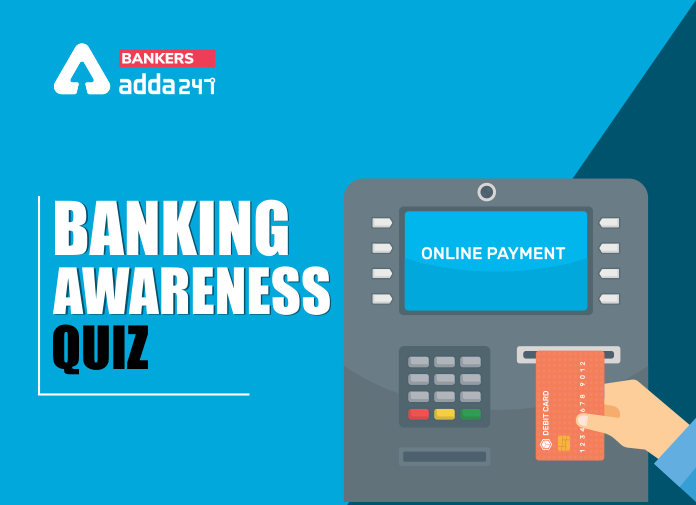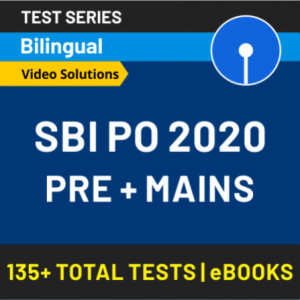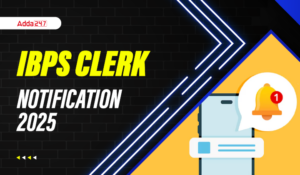Table of Contents
The Banking Awareness section constitutes a major part of a competitive examination and needs your undivided attention. With the increased competition in the field of Banking examinations, it has now become very important to cover up all the sections efficiently.
Banking Affairs 07th September 2020 Quiz
To complement your preparation for General Awareness section of the upcoming exams like SBI Clerk Mains and RBI Assistant Mains we are providing you Banking Awareness Quiz of 07th September 2020 covering the following topics: CCIL, Bank Identifier Codes, SWIFT, FVCI, FCCB.
Q1. ___________ to provide guaranteed clearing and settlement functions for transactions in Money, G-Secs, Foreign Exchange and Derivative markets.
(a) NPCI
(b) SEBI
(c) GOI
(d) RBI
(e) CCIL
Q2. _________ will be authorised operational entities, adhering to the standards for facilitating bill payments online as well as through a network of agents, on the ground.
(a) BBPCU
(b) BBPOU
(c) Biller Payment
(d) Creditor
(e) Assets and Liabilities
Q3. ___________ a/an electronic trading platform, operated by the Reserve Bank of India, used to facilitate the exchange of government securities and other money market instruments.
(a) Delivery versus Payment (DvP)
(b) Negotiated Dealing System (NDS)
(c) Risk Mitigation
(d) Competition Commission of India (CCI)
(e) None of the given options is true
Q4. The Clearing Corporation of India Ltd. (CCIL) was set up in?
(a) December 2010
(b) February 1995
(c) September 2006
(d) April 2001
(e) March 1999
Q5. Which of the following is the mode of settlement of securities where in the transfer of securities and funds happen simultaneously?
(a) Delivery versus Payment (DvP)
(b) Negotiated Dealing System
(c) Clearing Corporation of India Ltd. (CCIL)
(d) All of the Above
(e) None of the given options is true
Q6. Which scheme/act has enabled an expeditious and inexpensive forum to bank customers for resolution of complaints relating to certain services rendered by banks?
(a) Reserve Bank of India Act, 1934
(b) Banking Regulation Act, 1949
(c) Securitization Act 2002
(d) FEMA
(e) Banking Ombudsman Scheme
Q7. ______ is a standard format of Bank Identifier Codes(BIC) for banks to identify banks and financial institutions globally.
(a) RTGS
(b) IFSC
(c) NEFT
(d) SWIFT
(e) None of the given options is true
Q8. How many codes are there in SWIFT code?
(a) 8
(b) 11
(c) 7
(d) Both (b) and (c)
(e) Both (a) and (b)
Q9. First 4 characters in the SWIFT code refers to___________.
(a) Bank Code
(b) Country Code
(c) Branch Code
(d) location Code
(e) None of the given options is true
Q10. SWIFT stands for?
(a) Station for Worldwide Interbank Financial Telecommunication
(b) Solution for Worldwide Interbank Financial Telecommunication
(c) System for Worldwide Interbank Financial Telecommunication
(d) Service for Worldwide Interbank Financial Telecommunication
(e) Society for Worldwide Interbank Financial Telecommunication
IBPS PO and Clerk Prime 2020 Online Test Series
Q11. An Foreign Venture Capital Investors (FVCI) can invest in an Indian company engaged in______________.
(a) Biotechnology
(b) Dairy industry
(c) Production of bio-fuels
(d) IT related to hardware and software development
(e) All of the above
Q12. If the shares or convertible debentures are not issued within __________ days from the date of receipt of the inward remittance or date of debit to NRE/FCNR (B)/Escrow account, the amount shall be refunded.
(a) 210 days
(b) 150 days
(c) 180 days
(d) 120 days
(e) 90 days
Q13. FCCB is a type of corporate bond issued by an Indian company in an overseas market in a currency different from that of the issuer. FCCB stands for?
(a) Foreign Currency Convertible Board
(b) Foreign Currency Convertible Banking
(c) Foreign Currency Convertible Bond
(d) Foreign Currency Convertible Base
(e) Foreign Currency Convertible Basel
Q14. What is the meaning of “C” in ECB?
(a) Concourse
(b) Cashless
(c) Common
(d) Conclusion
(e) Commercial
Q15. External Commercial Borrowings (ECB) can be raised under Track-II for general corporate purpose (including working capital). The minimum average maturity period will be____________.
(a) 05 years
(b) 10 years
(c) 15 years
(d) 20 years
(e) 25 years
Solutions
S1. Ans.(e)
Sol. The Clearing Corporation of India Ltd. (CCIL) was set up in April, 2001 to provide guaranteed clearing and settlement functions for transactions in Money, G-Secs, Foreign Exchange and Derivative markets. The introduction of guaranteed clearing and settlement led to significant improvement in the market efficiency, transparency, liquidity and risk management/measurement practices in these market along with added benefits like reduced settlement and operational risk, savings on settlement costs, etc.
S2. Ans.(b)
Sol. Bharat Bill Payment Operating Units (BBPOUs) will be authorised operational entities, adhering to the standards set by the BBPCU for facilitating bill payments online as well as through a network of agents, on the ground.
S3. Ans.(b)
Sol. Till 2002, the Government securities market was mainly a telephone market. Buyers and sellers traded over telephone and submitted physical Subsidiary General Ledger (SGL) transfer forms for transfer of the Government securities and cheques for settlement of the funds to the Reserve Bank of India. These manual operations were inefficient and often resulted in delays. In order to improve efficiency in the market, the Reserve Bank of India took steps to automate the process of trading and settlement of Government securities transactions and the Negotiated Dealing System (NDS) was introduced in February 2002.
S4. Ans.(d)
Sol. The Clearing Corporation of India Ltd. (CCIL) was set up in April, 2001 to provide guaranteed clearing and settlement functions for transactions in Money, G-Secs, Foreign Exchange and Derivative markets.
S5. Ans.(a)
Sol. Delivery versus Payment (DvP) is the mode of settlement of securities where in the transfer of securities and funds happen simultaneously. This ensures that unless the funds are paid, the securities are not delivered and vice versa. DvP settlement eliminates the settlement risk in transactions.
S6. Ans.(e)
Sol. The Banking Ombudsman Scheme enables an expeditious and inexpensive forum to bank customers for resolution of complaints relating to certain services rendered by banks. The Banking Ombudsman Scheme is introduced under Section 35 A of the Banking Regulation Act, 1949 by RBI with effect from 1995.
S7. Ans.(d)
Sol. Society for Worldwide Interbank Financial Telecommunication (SWIFT) Code is a standard format of Bank Identifier Codes(BIC) for banks to identify banks and financial institutions globally.
S8. Ans.(e)
Sol. The Swift code consists of 8 or 11 characters. When 8 digits code is given, it refers to the primary office and 11
digits code refers to branch office.
S9. Ans.(a)
Sol. First 4 characters in SWIFT code represents– bank code (only letters).
S10. Ans.(e)
Sol. SWIFT stands for Society for Worldwide Interbank Financial Telecommunication. SWIFT provides a network that enables financial institutions worldwide to send and receive information about financial transactions in a secure, standardized and reliable environment.
S11. Ans.(e)
Sol. An FVCI can invest in an Indian company engaged in:-
1. Biotechnology
2. IT related to hardware and software development
3. Nanotechnology
4. Seed research and development
5. Research and development of new chemical entities in pharmaceutical sector
6. Dairy industry
7. Poultry industry
8. Production of bio-fuels
9. Hotel-cum-convention centres with seating capacity of more than three thousand.
10. Infrastructure sector.
S12. Ans.(c)
Sol. If the shares or convertible debentures are not issued within 180 days from the date of receipt of the inward remittance or date of debit to NRE/ FCNR (B)/ Escrow account, the amount shall be refunded. Further, Reserve Bank may on an application made to it and for sufficient reasons permit an Indian Company to refund/ allot shares for the amount of consideration received towards issue of security if such amount is outstanding beyond the period of 180 days from the date of receipt.
S13. Ans.(c)
Sol. A foreign currency convertible bond (FCCB) is a type of corporate bond issued by an Indian company in an overseas market in a currency different from that of the issuer. Investors have the option of redeeming their investment on maturity or converting the bonds into equity any time during the currency of the bond.
S14. Ans.(e)
Sol. ECB stands for External Commercial Borrowings.
S15. Ans.(b)
Sol. ECB can be raised under Track II for general corporate purpose (including working capital). The minimum average maturity period will be 10 years.
Download PDF for this Quiz
Click Here to Register for Bank Exams 2020 Preparation Material
You may also like to read:
- Current Affairs & Daily GK Updates 2020
- Latest GK and Current Affairs Questions With Answers For All Bank Exam
- SBI Clerk Result 2020
- Bihar Board 12th Result 2020
- NEET Admit Card 2020
6-7 September Current Affairs 2020 | Current Affairs Today | Daily Current Affairs 2020
Visit Achieversadda.com and participate in discussions with other aspirants and achievers. Get answers to your queries and connect with others on Achieversadda.com
All the Best BA’ians for RBI Assistant Mains!





 GA Capsule for SBI Clerk Mains 2025, Dow...
GA Capsule for SBI Clerk Mains 2025, Dow...
 The Hindu Review October 2022: Download ...
The Hindu Review October 2022: Download ...
 IBPS Clerk 2025 Notification, Exam Date ...
IBPS Clerk 2025 Notification, Exam Date ...





